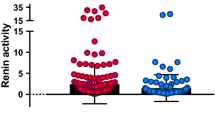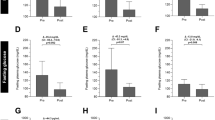Abstract
Background
Obesity induces cardiovascular alterations, including cardiac hypertrophy, impaired relaxation, and heart rate variability (HRV), which are associated with increased mortality. Gastric bypass surgery (GBP) reduces cardiovascular mortality, but the mechanisms involved are not clearly established. To date, the implication of postsurgical hormonal changes has not been tested. Our aim was to study the relationships between the evolution of cardiovascular functions after GBP and changes in metabolic and hormonal parameters, including glucagon-like peptide-1 (GLP-1) and brain natriuretic peptide (N-terminal pro-brain natriuretic peptide (NT-proBNP)).
Methods
Echocardiographic parameters, 24-h rhythmic Holter recording, plasma concentrations of GLP-1 before and after a test meal, and fasting NT-proBNP were assessed in 34 patients (M/F 2/32, age 36 ± 11 years, BMI 46 ± 6 kg/m2), before and 1 year after GBP.
Results
After GBP, excess weight loss was 79 ± 20 %. Blood pressure (BP), heart rate, and left ventricular mass decreased, while HRV and diastolic function (E/A ratio) improved. Plasma concentrations of NT-proBNP and postprandial (PP) GLP-1 increased. Changes in cardiovascular parameters were related to BMI and insulin sensitivity. Furthermore, the decrease in BP was independently associated with the increase of PP GLP-1 level and HRV was positively associated with NT-proBNP concentration after surgery.
Conclusions
The increase in endogenous GLP-1 observed after GBP was associated with decreased BP but not with improvement of other cardiovascular parameters, whereas the increase in NT-proBNP, within the physiological range, was associated with improved HRV.


Similar content being viewed by others
References
Algahim MF, Sen S, Taegtmeyer H. Bariatric surgery to unload the stressed heart: a metabolic hypothesis. Am J Physiol Heart Circ Physiol. 2012;302(8):H1539–H45.
Ussher JR, Drucker DJ. Cardiovascular biology of the incretin system. Endocr Rev. 2012;33(2):187–215.
Sjöström L. Review of the key results from the Swedish Obese Subjects (SOS) trial—a prospective controlled intervention study of bariatric surgery. J Intern Med. 2013;273(3):219–34.
Grapsa J, Tan TC, Paschou SA, et al. The effect of bariatric surgery on echocardiographic indices: a review of the literature. Eur J Clin Investig. 2013;43(11):1224–30.
Hsuan C-F, Huang C-K, Lin J-W, et al. The effect of surgical weight reduction on left ventricular structure and function in severe obesity. Obesity. 2010;18(6):1188–93.
Kardassis D, Grote L, Sjöström L, et al. Sleep apnea modifies the long-term impact of surgically induced weight loss on cardiac function and inflammation. Obesity. 2013;21(4):698–704.
Maser RE, Lenhard MJ, Peters MB, et al. Effects of surgically induced weight loss by Roux-en-Y gastric bypass on cardiovascular autonomic nerve function. Surg Obes Relat Dis. 2013;9(2):221–6.
Algahim MF, Lux TR, Leichman JG, et al. Progressive regression of left ventricular hypertrophy two years after bariatric surgery. Am J Med. 2010;123(6):549–55.
Straznicky NE, Grima MT, Sari CI, et al. The relation of glucose metabolism to left ventricular mass and function and sympathetic nervous system activity in obese subjects with metabolic syndrome. J Clin Endocrinol Metab. 2013;98(2):E227–E37.
Okerson T, Chilton RJ. The cardiovascular effects of GLP-1 receptor agonists. Cardiovasc Ther. 2012;30(3):e146–55.
Changchien E, Ahmed S, Betti F, et al. B-type natriuretic peptide increases after gastric bypass surgery and correlates with weight loss. Surg Endosc. 2011;25(7):2338–43.
Abrahamsson N, Engström B, Sundbom M, et al. Gastric bypass surgery elevates NT-ProBNP levels. Obes Surg. 2013;23(9):1421–6.
Martin J, Bergeron S, Pibarot P, et al. Impact of bariatric surgery on N-terminal fragment of the prohormone brain natriuretic peptide and left ventricular diastolic Function. Can J Cardiol. 2013;29(8):969–75.
Coupaye M, Sabate JM, Castel B, et al. Predictive factors of weight loss 1 year after laparoscopic gastric bypass in obese patients. Obes Surg. 2010;20(12):1671–7.
Spencer KT, Kimura BJ, Korcarz CE, et al. Focused cardiac ultrasound: recommendations from the American Society of Echocardiography. J Am Soc Echocardiogr. 2013;26(6):567–81.
Teichholz LE, Kreulen T, Herman MV, et al. Problems in echocardiographic volume determinations: echocardiographic-angiographic correlations in the presence of absence of asynergy. Am J Cardiol. 1976;37(1):7–11.
Devereux RB, Alonso DR, Lutas EM, et al. Echocardiographic assessment of left ventricular hypertrophy: comparison to necropsy findings. Am J Cardiol. 1986;57(6):450–8.
Laville M, Romon M, Chavrier G, et al. Recommendations regarding obesity surgery. Obes Surg. 2005;15(10):1476–80.
Yeo I-K, Johnson R. A new family of power transformations to improve normality or symmetry. Biometrika. 2000;87:954–9.
Vest AR, Heneghan HM, Agarwal S, et al. Bariatric surgery and cardiovascular outcomes: a systematic review. Heart. 2012;98(24):1763–77.
Nathanson D, Zethelius B, Berne C, et al. Plasma levels of glucagon like peptide-1 associate with diastolic function in elderly men. Diabet Med. 2011;28(3):301–5.
Katout M, Zhu H, Rutsky J, et al. Effect of GLP-1 mimetics on blood pressure and relationship to weight loss and glycemia lowering: results of a systematic meta-analysis and meta-regression. Am J Hypertens. 2014;27(1):130–9.
Griffioen KJ, Wan R, Okun E, et al. GLP-1 receptor stimulation depresses heart rate variability and inhibits neurotransmission to cardiac vagal neurons. Cardiovasc Res. 2011;89(1):72–8.
Kim M, Platt MJ, Shibasaki T, et al. GLP-1 receptor activation and Epac2 link atrial natriuretic peptide secretion to control of blood pressure. Nat Med. 2013;19(5):567–75.
Khan AM, Cheng S, Magnusson M, et al. Cardiac natriuretic peptides, obesity, and insulin resistance: evidence from two community-based studies. J Clin Endocrinol Meta. 2011;96(10):3242–9.
Conflict of Interest
This work received financial support from Assistance Publique des Hôpitaux de Paris. The authors declare that they have no conflict of interest.
Ethical Approval
All procedures performed in studies involving human participants were in accordance with the ethical standards of the institutional and/or national research committee and with the 1964 Helsinki Declaration and its later amendments or comparable ethical standards.
Informed Consent
Informed consent was obtained from all individual participants included in the study.
Author information
Authors and Affiliations
Corresponding author
Rights and permissions
About this article
Cite this article
Gandolfini, MP., Coupaye, M., Bouaziz, E. et al. Cardiovascular Changes After Gastric Bypass Surgery: Involvement of Increased Secretions of Glucagon-Like Peptide-1 and Brain Natriuretic Peptide. OBES SURG 25, 1933–1939 (2015). https://doi.org/10.1007/s11695-015-1643-5
Published:
Issue Date:
DOI: https://doi.org/10.1007/s11695-015-1643-5




